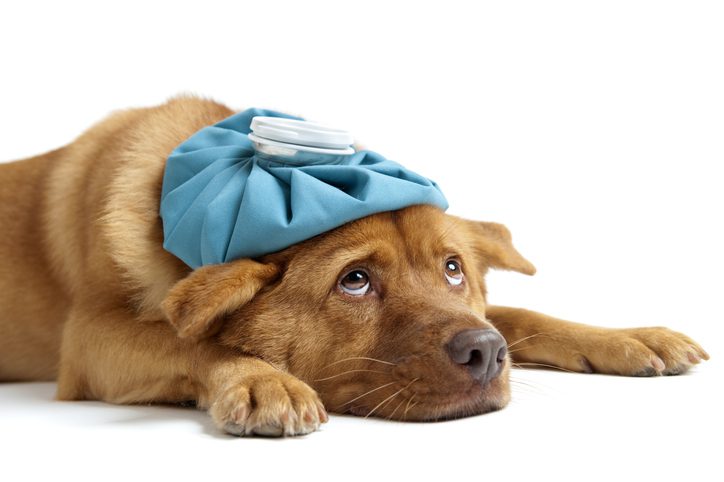Dogs can get colds, just like people. They might even show most of the same symptoms related to their cold, which makes it easy to recognize a cold in your dog. While dogs that live alone and are not exposed to other animals very often are unlikely to get a cold, dogs that go to puppy daycare or the dog park could have a much higher risk of getting sick.
Puppies are the most likely to contract a cold, but older dogs can get sick as well. People and dogs cannot share colds back and forth, so your cold is not contagious to your dog or vice versa. Dogs that are exposed to lots of other pets are the most likely to get sick with a cold, and it can be important to be sure that their symptoms are not the early signs of more serious problems like canine flu or kennel cough.

What Are the Symptoms of Colds in Dogs?
Dogs that have a cold will experience symptoms much like humans do when they have colds.
- Coughing
- Sneezing
- Nasal congestion
- Watery eyes
- Runny nose
- Body aches
- Sore throat
- Fever
Your dog might have all these symptoms, or just a few of them, depending upon the severity of their illness.
What Other Illnesses Can Seem Like Colds?
If you are worried that your dog might have another condition instead of a cold, you should know more about the more severe conditions that can cause cold symptoms in dogs.
Kennel Cough
Kennel cough can spread like wildfire through shelters, kennels, and doggy daycares. This is a more severe cold that causes coughing and can lead to respiratory distress in dogs of all ages. Puppies can die from kennel cough if it is not treated early on. Vaccinating your dog for Bordetella can help to reduce the risk that your dog will contract this ailment, but it is still more common than pet owners think.
Canine Influenza
The canine flu has the same symptoms as colds in most cases, but it is even more contagious. Nearly every dog that is exposed will become infected, even if only 80% show symptoms. This is an illness associated with secondary pneumonia or bacterial infections, but there is a canine influenza vaccine which can help to reduce the chances that your dog will contract this illness.
Foreign Objects or Allergies
In some cases, foreign objects in the nasal passages can cause cold-like symptoms, and dogs that have severe allergies might also be misdiagnosed with a cold by their owners. Allergies and foreign bodies can both become highly problematic if left untreated, so these conditions deserve attention just like other kinds of illnesses from viruses or bacteria.
Fungal Infections
Fungal infections can also have cold-like symptoms, and dogs that have contracted these conditions might be hard to treat. Fungus is often tough to eradicate, and these kinds of infections can resist treatment for years. It can also be tough to diagnose fungal infections, so you will need to work with your veterinarian to try and get a proper diagnosis of this condition to improve your ability to treat it.
Can My Dog Get Coronavirus?
There have been some reported cases of COVID-19 being contracted by dogs, but this is quite uncommon overall. The symptoms in dogs that contracted this ailment were very mild as compared to most human cases, and none of the cases were fatal. This is very helpful for those who are worried about their dog contracting the illness if someone in your family has come down with it.
While there is some small risk that your dog could contract coronavirus if you or someone in your home has contracted it, this is not a significant risk that you should be concerned about. The vast number of cases of this illness that are not spread to canine populations indicates that this is not a risk to be deeply concerned about.
What to Do if Your Dog Has a Cold
If your dog has a cold, don’t panic! So long as they are eating and drinking as usual, they will likely recover from their cold on their own. If the pads of your dog’s feet are hot and their nose is hot, you should probably take them to the vet to be looked at. The same is true if your dog is showing more severe symptoms like vomiting and diarrhea or they have stopped eating and drinking.
Colds in dogs are usually very mild, and your pet might just be sleepy and a bit less energetic for a few days while they recover. Keep an eye on things like water intake to make sure that your dog does not get dehydrated or end up with other health issues.
Conclusion
Dogs can contract colds just like people, and the symptoms of your dog’s cold will likely be much the same as if you have gotten a cold. Keep an eye out for symptoms that are more severe, that might indicate that your dog is getting a secondary infection or that they have contracted something more serious than a cold. Paying attention to water intake and appetite can make all the difference when catching a more severe illness early and seeking treatment for it.
Your dog will likely get over their cold without medical intervention but do not hesitate to take your dog to the vet if they are showing signs of a more severe illness. This is particularly true in puppies since they are so much more fragile and likely to become severely dehydrated. Make sure that you vaccinate your dog for influenza and Bordetella as well to try and remove some of the risk that your pet will contract an illness at the dog park or when visiting doggy daycare. While colds cannot be 100% prevented, you can help your dog to avoid this issue most of the time through vaccination and taking care about their interactions with other animals.
Worried your dog may have a cold in Monroeville, PA? Call 412-373-8580 to talk with your veterinarian at Northern Pike Veterinary Hospital!

